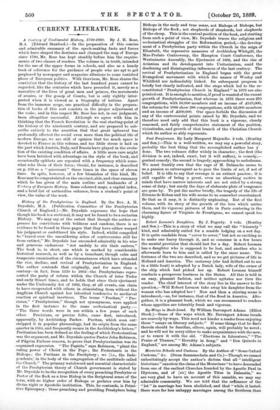CURRENT LITERATURE.
A Century of Continental History, 1780-1880. By J. H. Rose, M.A. (Edward Stanford.)—In the preparation of this concise and admirable summary of the epoch-making facts and forces which have shaped the destinies and changed the map of Europe since 1780, Mr. Rose has kept steadily before him the require- ments of two classes of readers. The volume is, in truth, intended for the use of the upper forms in schools, and also as a handy book of reference for the guidance of people who are apt to get perplexed by newspaper and magazine allusions to some vanished phase of European politics.. With Gervinus, Mr. Rose shares the conviction that the history of the last hundred years cannot be regarded, like the centuries which have preceded it, merely as a narrative of the lives of great men and princes, the movements of armies, or the gossip of Courts, but is only rightly inter- preted when it is viewed as a biography of nations. Apart from the immense scope, one practical difficulty in the prepara- tion of books of this sort consists in the proper adjustment of the scale; and in this respect Mr. Rose has not, in our judgment, been altogether successful. Although we agree with him in thinking that the French Revolution is the real starting-point of the history of the nineteenth century, and are prepared to sub- scribe entirely to the assertion that that great upheaval has profoundly affected the social even more than the political life of modern Europe, we are still of opinion that too much space is devoted to France in this volume, and too little stress is laid on the part which Austria, Italy, and Russia have played in the evolu- tion of the existing condition of affairs. A little more care might have been lavished with advantage on the style of the book, and occasionally epithets are repeated with a frequency which some- what robs them of their force; Orsini, for instance, is described on p. 259 as a " miscreant " three times in the space of eleven lines. In spite, however, of a few blemishes of this kind, Mr. Rose may be congratulated on the succinct, able, and clear summary which he has given of the main outline and landmarks of A Critury of European History. Some coloured maps, a capital index, and a brief list of authorities enhance, from a student's point of view, the value of the work.






































 Previous page
Previous page